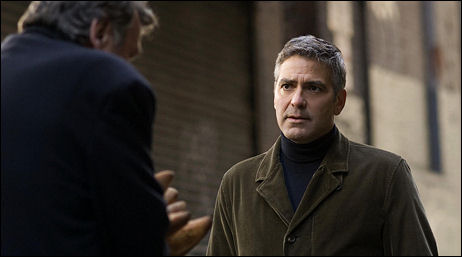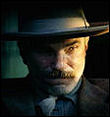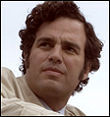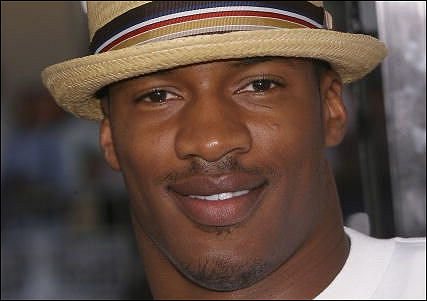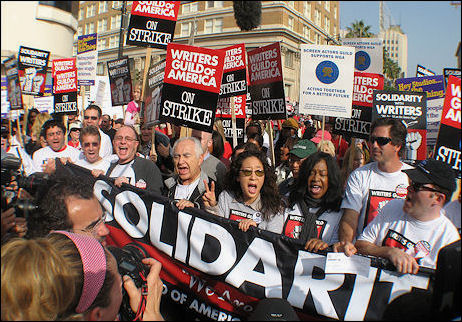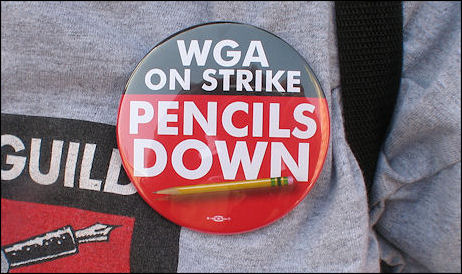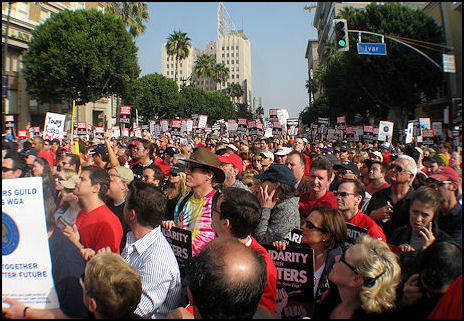EW columnist Mark Harris recently ran a list of things to remember in calibrating the Oscar race, including four that apply to online columnists:
1. “Don’t trust any handicapper who’s beating a drum too loudly,” Harris warns. “In the last few years, bloggers have blurred the line between Oscar prediction and advocacy — something that has had no discernible effect on the nominations, but has lowered their batting average. Nine out of 10 bad calls are made because you love or hate a movie so intensely you’re blind to reason. Everybody relishes making an out-on-a-limb guess that pays off, but try to keep one foot on planet Earth: If you’re the only one talking up Billy Bob Thornton for Mr. Woodcock, it’s not because everybody else is an idiot.”
HE response: So beating a passionate drum for the incontestably great Zodiac ** as a Best Picture contender or Benicio del Toro or Sam Riley for Best Actor means a columnist is untrustworthy? Dispassionate pundits and finger-to-the-wind pulse-readers are a dime a dozen. Gotta feel it, gotta want it, gotta lay it on the line. “Reason” is the last thing you want to bring into a debate about movies. (Are Boston Red Sox fans “reasonable”?) Be reasonable, Mr. Prognosticator. People love Chicago, the singing and dancing make them feel good, and it’s going to win the Best Picture Oscar. Sit down and be reasonable and accept the genius of the crowd.
2. “Keep internet noise in perspective,” Harris cautions. “Remember that Oscar voters don’t follow every who’s-up/who’s-down microtwitch; they’re busy seeing (or making) movies. And bear in mind that some of those bloggers tend to get chest-thumpy about a certain type of (usually male, usually violent) film: This year, a lot of bluster is already massing around No Country for Old Men and There Will Be Blood. They’re contenders, but rhetoric doesn’t equal votes.”
HE response: Fair enough, but anyone who dismisses No Country because of its ending..forget it. That drum has been beaten enough over the last couple of days.
3. “Don’t trust lingo,” Harris cautions. “Memorize these translations: ‘Insiders tell me…’ (Meaning: I talked to a publicist.) ‘Word on the street is…’ (Meaning: I talked to a publicist.) ”The Academy screening went well.’ (Meaning: The Academy screening took place.) ‘Voters are leaning toward…’ (Meaning: I am completely making this up.)”
HE response: There’s obviously truth in what Harris says, but there is also a very real thing that I’ve described a couple of times as “intellectual dandelion pollen” — ideas, moods and intellectual currents that float and swirl around and seep into people’s ears and heads. If you have what I’ve long referred to as “insect antennae” — two invisible mood/current/state-of-the-zeitgeist detectors sticking out of the top of your head — you can feel read what’s being felt, what’s catching on or cooling off, what’s being re-assessed.
4. “Beware numerical formulas,” says Harris. “A prognosticator who tells you, ”Only four times in history has the second-place finisher in the New York Film Critics Circle also received a SAG nomination and still failed to…’ is working too hard. Math can’t trump instinct.”
HE response: Total agreement.
** The fact that safety-zone bloggers haven’t supported, much less acknowledged, Zodiac‘s greatness means it probably won’t be nominated by the Academy, but that doesn’t change what it is, how history will see it down the road, and how short-sighted those who pooh-poohed it will seem to their children and grandchildren.
